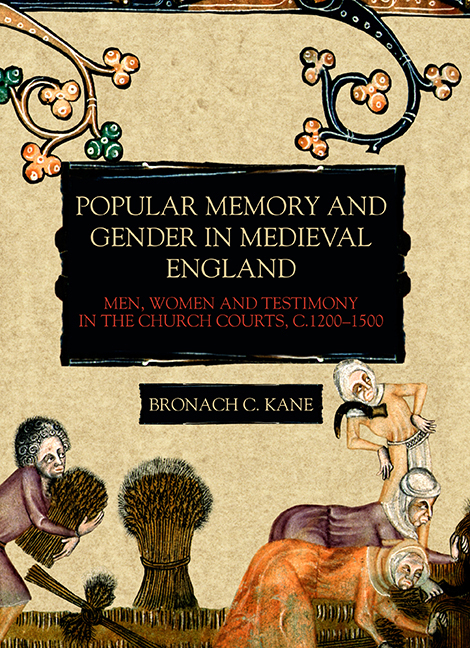 Popular Memory and Gender in Medieval England
Popular Memory and Gender in Medieval England Published online by Cambridge University Press: 03 September 2019
Memory and introspection lay at the heart of the spiritual relationship between the clergy and laity in late medieval England, and this is best exemplified in confessional interrogation. In 1240, Walter de Cantilupe, bishop of Worcester, composed a Summula that counselled confessors on how to extract memories of sin from penitents. Later appended to the Statutes of Exeter in 1287, the tract interpreted biographical memory as a chronicle of past misdeeds. The penitent was instructed to ‘return to the beginning of his life how he had been born, reflecting on all the years of his life that he can remember, and what he did in what years and on what days’. Parish clergy with the cure of souls were ordered to hold a copy of the Summula, while those lacking a copy received a penalty of 1 mark. The Summula and similar treatises on virtues and vices embodied the Church's mounting interest in pastoral care, which intensified from the late twelfth century onwards. This programme gained formal confirmation in ecclesiastical councils and a raft of provincial and diocesan legislation, facilitating a growth in Latin and vernacular literature dedicated to pastoral duties.
This pastoral drive in the parishes coincided with the emergence of the ecclesiastical courts as a mechanism for detection and arbitration in medieval society. In theory and practice, the Church's pastoral and legal functions reflected similar concerns with the interior lives and moral behaviour of parishioners. As less rational forms of proof declined across Europe in the twelfth century, the more widespread use of witnesses generated written forms of evidence based on subjective depictions of past events. Canonists already familiar with traditions from Roman law produced an increasing body of work on the examination of witnesses. From the late twelfth century onwards, both proceduralists and decretal law explored and attempted to reconcile agreed methods of weighing the value of witness testimony. In common with the expansion of confessional practice, the ‘routine of interrogation’ provided the force behind these developments, fostering a novel emphasis on selfexamination among penitents and canonical witnesses alike. Theological teachings on conscience were framed in terms of its relationship to sin, while introspection in both penitential and legal terms was achieved through the remembrance of past behaviour.
To save this book to your Kindle, first ensure [email protected] is added to your Approved Personal Document E-mail List under your Personal Document Settings on the Manage Your Content and Devices page of your Amazon account. Then enter the ‘name’ part of your Kindle email address below. Find out more about saving to your Kindle.
Note you can select to save to either the @free.kindle.com or @kindle.com variations. ‘@free.kindle.com’ emails are free but can only be saved to your device when it is connected to wi-fi. ‘@kindle.com’ emails can be delivered even when you are not connected to wi-fi, but note that service fees apply.
Find out more about the Kindle Personal Document Service.
To save content items to your account, please confirm that you agree to abide by our usage policies. If this is the first time you use this feature, you will be asked to authorise Cambridge Core to connect with your account. Find out more about saving content to Dropbox.
To save content items to your account, please confirm that you agree to abide by our usage policies. If this is the first time you use this feature, you will be asked to authorise Cambridge Core to connect with your account. Find out more about saving content to Google Drive.